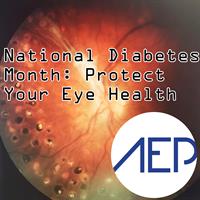As we step into November, it's not just the season of falling leaves and cozy sweaters; it's also National Diabetes Month. This time of year, we emphasize the crucial link between diabetes and eye health. At Advanced Eyecare Professionals, we want to raise awareness about how diabetes can affect your vision and the importance of yearly comprehensive eye exams. November is National Diabetes Month: Protect Your Eye Health
Diabetic retinopathy is one of the eye diseases that can stem from diabetes and is a condition where diabetes causes damage to the retina. It is the leading cause of blindness among American adults. Sadly, many instances of vision loss from diabetic retinopathy could have been prevented with appropriate treatment and regular eye exams. Once damage has occurred, it is not possible to regain lost vision.
Ophthalmologist, Dr. David Harrell with Advanced Eyecare Professionals states. “Diabetes can cause serious bleeding, damage to the retina, and occasionally severe glaucoma or high pressure in the eye. All of these can be diagnosed and usually treated with early detection through regular eye exams. I have even diagnosed patients with diabetes who did not know they had the disease.“
According to the American Diabetes Associations in 2021, 38.4 million Americans, or 11.6% of the population, have diabetes. 2 million Americans have type 1 diabetes, including about 304,000 children and adolescents. These numbers are only expected to grow in the upcoming years due to the decrease in physical activity and healthy eating.
TYPES OF DIABETES
TYPE 1
A chronic condition in which the pancreas produces little or no insulin. Type 1 diabetes was previously known as juvenile diabetes. However, anyone at any age can get type 1 diabetes.
TYPE 2
90% of Americans with diabetes have type 2 diabetes. This occurs when your body is not using insulin correctly, called insulin resistance. Risk factors for type 2 diabetes include obesity, an unhealthy diet, and physical inactivity.
COMPLICATIONS OF DIABETES
Not managing or treating your diabetes can cause serious health complications including hypoglycemia, skin infections, neuropathy, kidney disease, foot complications, and eye complications. Additionally, people with diabetes are at a higher risk for blindness and eye problems. The good news is with the correct treatment and lifestyle changes many people can prevent the onset of these complications. Therefore, we recommend yearly eye exams to avoid eye problems and vision loss.
TYPES OF DIABETIC EYE DISEASE
Diabetic Retinopathy:
Light-sensitive tissue comprises the retina that lines the back of the eye. With diabetic retinopathy, changes to blood vessels in the rear of the eye cause bleeding or leaking fluid, which starts to distort vision. The changes in blood flow happen because diabetes (especially uncontrolled diabetes) can create chronically high blood sugar. This damages very small blood vessels in the retina and eventually leads to retinopathy.
According to the CDC between 12,000 and 24,000 new cases of blindness due to diabetic retinopathy occur each year in the U.S.
Clinically significant macular edema: Swelling of the macula in the back of the eye. Macular edema is most common in those with type 2 diabetes.
Cataract: Clouding in the lens of your eyes. Cataracts are two-five times more likely to appear earlier in people with diabetes.
Glaucoma: Optic nerve damage to the fibers that connect the eye to the brain. Diabetes doubles the risk of glaucoma.
Routine eye exams are the best way to preserve and protect the precious gift of sight. To monitor the health of your eyes, a well eye exam is recommended yearly for everyone. A complete dilated medical eye exam is very important for those with diabetes and/or over 40 because there are many eye diseases that damage the eyes before symptoms are noticeable. The risk of eye disease increases with age for everyone, but if there is a positive family history it is particularly important. Undiagnosed glaucoma, macular degeneration, and diabetes are the leading causes of blindness in the United States. It is possible that you can lose almost 50% of your vision before you notice any changes!
If you have any questions about diabetes and your eye health please call Advanced Eyecare Professionals located in Hastings, MI 269-945-3866 or message online at www.AEPeyecare.com.
Advanced Eyecare Professionals
Kelli Worth Marketing










